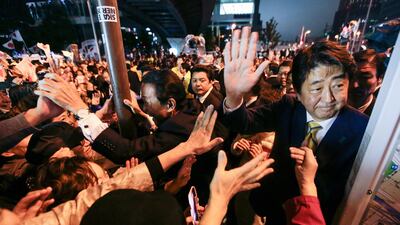A powerful typhoon was bearing down on Japan on Saturday, a day ahead of national elections, with experts predicting severe winds and heavy rains as the country goes to the polls.
Super typhoon Lan, described as "very large" and "very strong" by Japan's meteorological agency, was packing gusts up to 252 kilometres per hour on Saturday above Pacific waters south of Japan.
As Lan drew closer, voters on remote southern islands in the path of the storm cast their ballots early for Sunday's election.
The joint typhoon warning centre of the US navy called it a super typhoon.
The Japanese meteorological agency said Lan would move just east of Okinawa on Sunday before grazing the country's coastal areas, possibly directly hitting Tokyo or surrounding regions on Monday morning.
Meteorologists expect strong winds and heavy rain across much of Japan on Sunday.
Regardless of weather, national surveys have largely predicted that the ruling bloc, led by prime minister Shinzo Abe, is likely to claim a landslide victory.
_______________
Read more:
Two dead, three missing in Japan as powerful typhoon rips through country
Japan disaster minister resigns after earthquake gaffe sparks outrage
_______________
Mr Abe has called on voters to cast their ballots early to avoid bad weather.
Turnout has declined to below 60 per cent in the last two general elections. The last vote in December 2014 saw a record-low rate of 52.66 per cent.
On Saturday, Mr Abe vowed to protect the Japanese people as he wrapped up an election campaign dominated by threats from North Korea.
The predicted landslide victory for Mr Abe and his conservative Liberal Democratic Party (LDP) would him a fresh mandate for his hardline stance on North Korea and his "Abenomics" growth strategy.
Mr Abe's coalition is on track to win around 300 seats in the 465-seat lower house of parliament, according to a projection published by the Nikkei daily newspaper.
If the polls are correct, 63-year-old Mr Abe is on course to be the longest-serving premier in post-war Japan, the world's third-biggest economy and key US ally in Asia.
"It has been a very tough election," Mr Abe told crowds that braved the rain in central Japan, as Lan barrelled towards the country.
"The ruling bloc … is the one that can protect people's lives and defend our happy way of life," he said, in a clear reference to North Korea, which has threatened to "sink" Japan into the sea and fired two missiles over the country.
_______________
Read more: World leaders react in alarm as North Korea fires ballistic missile over Japan
_______________
Mr Abe has stuck to a hawkish stance on North Korea, stressing that maximum pressure should be exerted on the regime and backing the US line that "all options" are on the table.
Throughout the short 12-day campaign, the premier has railed against Pyongyang, telling a crowd recently: "At a time like this … we cannot waver. Everyone, we must not yield to the threat of North Korea!"
Mr Abe enjoys only lukewarm public support but the weak and fragmented opposition has been unable to make inroads into his poll lead during the campaign.
The two main opposition parties — the "Party of Hope" created by the media-savvy Tokyo governor Yuriko Koike and the new centre-left Constitutional Democratic Party — are trailing far behind, predicted to win around 50 seats each.
"You must not stick to the status quo of flaccid politics, which has failed to carry out drastic and necessary reforms," Ms Koike said in a last-ditch appeal to voters on Saturday.
"If we do not use this opportunity [to oust Abe], major reforms that are truly needed will be delayed," she said.
Aside from North Korea, many voters regard the economy and reforming the costly social security system as their priority concerns, as Abe has not quite fully revived the once world-beating Japanese economy after five years in power.
Mr Abe says his trademark "Abenomics" strategy of ultra-loose monetary policy and big fiscal spending is the best way to pep up the economy, which is weighed down by debt and struggling with deflation.
He has also pledged to use part of the proceeds from a planned sales tax hike to fund free childcare in a bid to get more women into the workplace.
Ms Koike wants to scrap the tax hike, arguing it would throttle a recovery that has seen Japan's longest stretch of growth in a decade.
But after a blaze of publicity when Ms Koike created her new "Party of Hope", the bubble appears to have burst for the popular 65-year-old former newscaster, partly because she declined to run herself for prime minister.
"Every party has to have, to be credible, a candidate for prime minister and she would have been it but then she walked away and it is a ship that suddenly has no captain," said Michael Cucek, an adjunct professor at Temple University's Japan campus.
Another brand-new party, the centre-left Constitutional Democrats, appears to have some momentum going into the poll, however, and could do better than expected.

